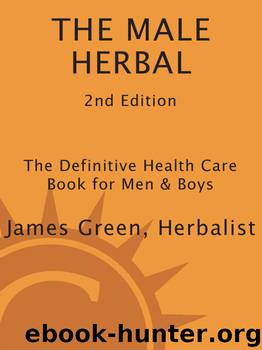The Male Herbal by James Green

Author:James Green [Green, James]
Language: eng
Format: epub
ISBN: 978-0-307-77945-8
Publisher: Potter/Ten Speed/Harmony/Rodale
Published: 2011-03-01T16:00:00+00:00
Hair Care
Certainly, heredity has a great deal to do with the condition of one’s hair. However, no one is rendered powerless by genetics. There are things one can do to condition the scalp, nourish and strengthen the hair, and stimulate hair growth. The herb Saw Palmetto has been shown to significantly improve hair growth. Borage seed oil, a rich source of gamma-linolenic acid (GLA), along with alpha-linolenic acid (ALA) and linoleic acid (the two essential fatty acids), found in plant oils, treat male pattern baldness and other hair disorders. Both Saw Palmetto and Borage seed work in a similar way to finasteride, the active ingredient in Propecia, a synthetic drug prescribed for male pattern baldness. But finasteride has systemic side effects, leading to loss of libido, and is contraindicated for use by women, whereas Saw Palmetto and Borage seeds nourish both males and females, and the only side effect of Saw Palmetto on some people is prolonged grimacing at its nasty taste.
Saw Palmetto, which has been used extensively to treat an enlarged prostate in men, has been shown to block the androgen receptors found in the hair follicles, preventing DHT attachment and uptake, and to stimulate hair growth by inhibiting the type I form of 5-alpha-reductase (the enzyme present in high concentrations in the scalp, sebaceous glands, and the skin), as well as the type II form of 5-alpha-reductase (found in the hair follicles). Finasteride, on the other hand, blocks only type II.
Borage seed oil is considered nature’s richest source of GLA (20+ percent), followed by Black Currant seed oil (15 percent) and Evening Primrose oil (9 percent). GLA and the other fatty acids have been individually proven the most powerful inhibitors known today of 5-alpha-reductase forms I and II.
Other pertinent notes about hair care:
Experiments conducted in Sweden and the United States indicate that cutting down on excess salt in the diet will keep the hair more healthy and reduce hair loss.
Iodine deficiency in the diet will cause dryness, thinness, and poor growth of hair. Kelp, dulse, and other sea vegetables, as well as seafoods, are the richest natural sources of iodine.
The micronutrients particularly essential for hair care are vitamin?complex, vitamin E, vitamin F (also called the essential fatty acids), and vitamins A and D (the universally acknowledged vitamins for hair and skin to treat dandruff and dry, itchy, and flaky scalps).
All minerals, especially the hair-shaft-strengthening mineral silica, along with the blood- and nerve-building minerals magnesium, calcium, potassium, phosphorus, and iron, are needed. (Horsetail herb tea is a rich source of silica.)
High-quality (but not necessarily high-quantity) protein is essential for healthy hair and a healthy scalp. (The recommended amounts are 56 to 68 grams of protein per day for a 165-pound sedentary to moderately active man and 48 to 54 grams per day for a 140-pound sedentary to moderately active woman.)
Emotional tension or prolonged mental stress and congestion cause constriction of blood vessels of the scalp, preventing the blood from coming to the hair roots; consequently, over time, such conditions can cause noticeable hair loss.
Download
This site does not store any files on its server. We only index and link to content provided by other sites. Please contact the content providers to delete copyright contents if any and email us, we'll remove relevant links or contents immediately.
| Hair Loss | Prostate Health |
| Sexual Health & Impotence |
The Ultimate Guide to Fellatio by Violet Blue(1949)
101 Get-Lean Workouts and Strategies by Muscle & Fitness(1870)
The Penis Book by Aaron Spitz(1786)
The Doctors Book of Home Remedies by Prevention Magazine Editors(1560)
The Book of Pook by Pook(1457)
Younger Next Year by Chris Crowley(1440)
The World's Fittest Book: How to train for anything and everything, anywhere and everywhere by Ross Edgley(1431)
Future Man by Tim Samuels(1385)
The Ins and Outs of Gay Sex by Stephen E. Goldstone(1349)
The Men's Health Diet by Stephen Perrine(1307)
The HIIT Bible by Steve Barrett(1295)
What to Eat When by Michael Roizen & Michael Crupain & Ted Spiker(1286)
Living An Orgasmic Life by Xanet Pailet(1286)
Flat Belly Diet! for Men by Liz Vaccariello(1279)
Anabolics E-Book Edition by Llewellyn William(1267)
The Hook Up Handbook: 28 Fundamentals to Keep Her Coming Back for More by Perrotta David(1263)
The Esquire Guide to Bodyweight Training by Adam Schersten(1251)
The Ultimate Guide to Male Sexual Health: How to Stay Vital at Any Age by Dudley Seth Danoff MD FACS(1220)
The Men's Health Home Workout Bible by Lou Schuler(1165)
